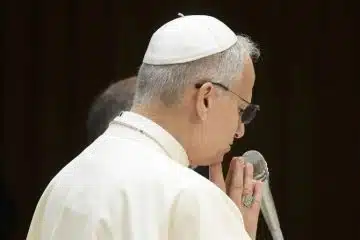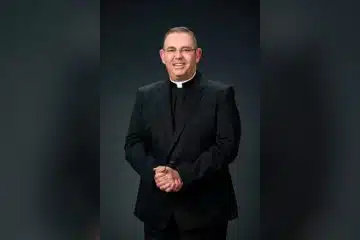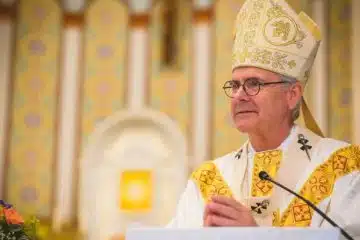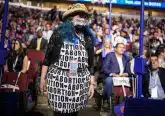Archbishop speaks about the blessings, challenges marriage offers the church
Wednesday, September 8, 2010
By Paul McKibben
ST. FRANCIS DE SALES DEANERY — Louisville Archbishop Joseph Kurtz provided insights into what the U.S. Catholic bishops are doing to promote marriage and offered advice for those who work to prepare couples for the Sacrament of Matrimony.
Archbishop Kurtz, who chairs the United States Conference of Catholic Bishops’ Ad Hoc Committee for the Defense Of Marriage, delivered the keynote address Aug. 28 at the Lay Pastoral Ministry Program’s daylong workshop, “Fostering a Marriage Friendly Church, a Look at the USCCB Document ‘Love and Life in the Divine Plan.’”
 |
| Louisville Archbishop Joseph E. Kurtz, chairman of the U.S. bishops’ Ad Hoc Committee for the Defense of Marriage, speaking Aug. 28 at the Athenaeum of Ohio. (CT/E.L. Hubbard) |
He said that the pastoral initiative on marriage “is attempting to assist all of us and each us in saying something about both the blessings and the challenges of marriage and family within our church but also within our culture.”
The bishops approved the pastoral letter last November after five years of work. The pastoral offers support to married couples and affirms that true marriage can involve only a man and a woman. It is a component of the bishops’ National Pastoral Initiative for Marriage.
Archbishop Kurtz, who has been Archbishop of Louisville since 2007, noted several statistics about marriage in his address. In most cases since the mid-1980s there has been about a 40 percent decrease in couples turning to the church for sacramental marriage. In 1970 in the United States, about a half a million couples were living together without being married. That increased to 5 million couples five years ago, and last year the figure was between 7-8 million. The average age for marriage is now 27.
The statistics offer clear challenges for the church, and the USCCB has launched a website (http://foryourmarriage.org) to better publicize the pastoral letter, “Marriage: Love and Life in the Divine Plan” and the church programs and materials which address these challenges.
The pastoral letter on marriage, the archbishop said, speaks about God’s plan and what it means to build virtue in the lives of a couple, with special attention given to generosity.
Archbishop Kurtz outlined five steps toward developing a marriage-friendly parish and diocese:
• The church needs to speak, teach and preach about marriage in a very positive way but also in a very public way. He said this needs to be done by highlighting stories of people who are loving and who are embracing married love.
• The church needs to be part of the preparation of couples getting ready for marriage, and the church needs to convey the theme that “a wedding is a day, marriage is a lifetime.”
• The church is not finished with a couple when they leave the altar after their vows; marriage enrichment is a very important thing.
• There is a need for healing. He said the Retrouvaille program (for married couples who are considering separation and those who are already separated or divorced who want marital help) is a great gift within the church that many people don’t know about — or don’t know enough to invite people to be a part of.
• There needs to be the cultivation of the presence of young adults within the church.
During a question-and-answer session, the archbishop was asked why more homilies about marriage are not delivered. He said that in following the pattern of Scripture in the “Lectionary,” a priest may not necessarily think he should be developing a theme.
Toledo Bishop Leonard Blair has proposed “what he called ‘a respect marriage Sunday,’” Archbishop Kurtz noted. He said if such a theme developed, he would promote as “a celebrate marriage Sunday.”
“Let’s pick a weekend in which the readings really fit it, and we prepare the packets,” he added. “Each year, maybe (it’s) a different one, similar to what we do with Respect for Life in October,” he said.
The archbishop said that the USCCB website has a special section about the defense of marriage, which includes the first of five videos in a series, “Marriage: Unique for a Reason.” He said the U.S. bishops are trying to find ways to deliver messages about marriage, and this area of the website exists primarily to help priests, deacons and catechists understand how they can speak about issues of marriage.
Margaret Shank, pastoral associate at St. Mary Church in Hyde Park, said the one aspect that stood out for her from the talk was when Archbishop Kurtz “talked about [how] we’re a church that needs to welcome, but we are also a church that needs to call to conversion.”
Shank prepares couples for marriage at St. Mary. She said in the past people have been hesitant to share church teaching about sexual activity because they don’t want to offend or embarrass the couple.
She said that during her second meeting with couples in marriage preparation she talks with them about Natural Family Planning and Pope John Paul II’s “Theology of the Body,” and challenges the couple to refrain from sexual activity until they’re married. The response has been positive, she said.
The daylong marriage program, held in the Bartlett Center at Mount St. Mary’s Seminary/Athenaum of Ohio, included workshops and large-group reflections.
“We offer an annual day of reflection or formation for our students, our graduates, mentors in the program and any interested people in the community,” said Susan McGurgan, director of the LPMP. “And the topics vary from year to year.”
McGurgan said these have included biblical studies, biblical spirituality and a recent one on Marian spirituality. She said the programs are held once or twice a year.













